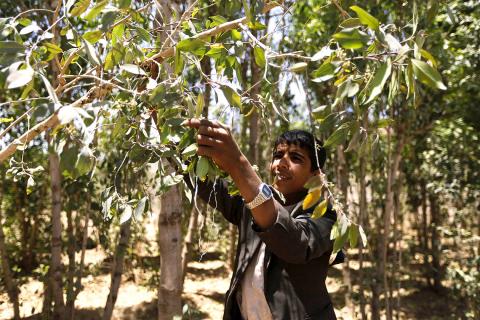Mountainous Yemen is blessed with more water than its Arabian desert neighbors, but the national passion for chewing the stimulant plant qat threatens to exhaust that precious resource.
In the mountains around the Yemeni capital, Sana’a, farmers are drilling so many unlicensed boreholes to irrigate the thirsty crop craved by the city’s residents that the water table is falling by as much as 6m a year. As a result, engineers now have to drill 1,500m in some areas before reaching the aquifer.
Qat is an evergreen shrub native to the Arabian Peninsula and the Horn of Africa, and chewing its leaves and shoots as a stimulant dates back centuries. Yet it is only in the past half century that its consumption has spread from the elite to become a focal point of Yemeni social and business life.

Photo: AFP
For Yemeni men, an afternoon chewing qat while decked out in traditional robes is an opportunity to cement social ties, seal business deals, or debate the issues of the day, and now increasing numbers of women and teenagers are also indulging in the habit.
Sales of qat in Yemen are estimated to run to US$800 million a year, a huge sum in a country ranked by the UN as 160th in the world for human development — the lowest in Asia bar war-torn Afghanistan.
Only 10,000 hectares were given over to cultivation of the crop in the 1970s, but by 2012 that figure had risen to 167,602 hectares, accounting for 12 percent of Yemen’s arable land.

Photo: Reuters
Its attraction to farmers is not difficult to understand. According to the Yemeni of Ministry Agriculture, qat can earn a planter US$12,500 a hectare, three times the revenue of any other crop. It takes five years to get a harvest from a fruit tree, but just a few months for a qat plant, and it can be harvested as many as four times a year.
However, each crop comes at a heavy cost in water usage since the plants are watered heavily for a month before harvesting to ensure that the tender leaves and shoots that users chew are as soft and moist as possible. One day’s supply of qat for a single user requires an estimated 500 liters of water to produce.
In Sana’a Province alone, there are 4,000 wells drilled without authorization to irrigate qat, water expert Omar Madhaji said. Excessive pumping is lowering the level of the water table by 3m to 6m annually, he warned.
Geologist Ismael al-Janad said that the Sana’a Basin aquifer is being drained at an unsustainable rate.
“The only alternative to the depletion of the water table is to take urgent measures to prohibit the use of water pumped from the aquifer for irrigation,” he added.
Yemeni Minister of Water Abdo Razaz Saleh acknowledged that the government had failed to stop unlicensed companies from digging deep wells, adding that 150 such companies operate in Sana’a alone, among 950 nationwide.
The upshot is that in a country that enjoys much higher rainfall that its mainly desert neighbor Saudi Arabia, mains water is heavily rationed, even for those who have it.
In Sana’a, a city of about 3 million people, only 45 percent of households have mains water and the taps are switched on just twice a week, water authority chief Ali al-Sarimi said.
Everyone else relies on privately owned boreholes.
“Most people in this area depend on the well,” resident Bashir Nashwan said as he queued at one Sana’a pumping station. “The water is provided by a generous donor, but it is always crowded and we have to queue for hours.”
Sarifi said just one-third of the 3 billion cubic metes of water that Yemen consumes each year comes from renewable sources. The rest comes from aquifers that have taken millions of years to form and cannot be replaced.

Nvidia Corp chief executive officer Jensen Huang (黃仁勳) on Monday introduced the company’s latest supercomputer platform, featuring six new chips made by Taiwan Semiconductor Manufacturing Co (TSMC, 台積電), saying that it is now “in full production.” “If Vera Rubin is going to be in time for this year, it must be in production by now, and so, today I can tell you that Vera Rubin is in full production,” Huang said during his keynote speech at CES in Las Vegas. The rollout of six concurrent chips for Vera Rubin — the company’s next-generation artificial intelligence (AI) computing platform — marks a strategic

REVENUE PERFORMANCE: Cloud and network products, and electronic components saw strong increases, while smart consumer electronics and computing products fell Hon Hai Precision Industry Co (鴻海精密) yesterday posted 26.51 percent quarterly growth in revenue for last quarter to NT$2.6 trillion (US$82.44 billion), the strongest on record for the period and above expectations, but the company forecast a slight revenue dip this quarter due to seasonal factors. On an annual basis, revenue last quarter grew 22.07 percent, the company said. Analysts on average estimated about NT$2.4 trillion increase. Hon Hai, which assembles servers for Nvidia Corp and iPhones for Apple Inc, is expanding its capacity in the US, adding artificial intelligence (AI) server production in Wisconsin and Texas, where it operates established campuses. This

US President Donald Trump on Friday blocked US photonics firm HieFo Corp’s US$3 million acquisition of assets in New Jersey-based aerospace and defense specialist Emcore Corp, citing national security and China-related concerns. In an order released by the White House, Trump said HieFo was “controlled by a citizen of the People’s Republic of China” and that its 2024 acquisition of Emcore’s businesses led the US president to believe that it might “take action that threatens to impair the national security of the United States.” The order did not name the person or detail Trump’s concerns. “The Transaction is hereby prohibited,”

Garment maker Makalot Industrial Co (聚陽) yesterday reported lower-than-expected fourth-quarter revenue of NT$7.93 billion (US$251.44 million), down 9.48 percent from NT$8.76 billion a year earlier. On a quarterly basis, revenue fell 10.83 percent from NT$8.89 billion, company data showed. The figure was also lower than market expectations of NT$8.05 billion, according to data compiled by Yuanta Securities Investment and Consulting Co (元大投顧), which had projected NT$8.22 billion. Makalot’s revenue this quarter would likely increase by a mid-teens percentage as the industry is entering its high season, Yuanta said. Overall, Makalot’s revenue last year totaled NT$34.43 billion, down 3.08 percent from its record NT$35.52